
Al Mazrouei ... satisfied with Opec compliance
UAE sees healthy oil demand from emerging markets
DUBAI, April 18, 2017
The UAE sees a healthy level of demand for crude oil in the future from emerging economies in Africa and Asia and the country will remain commercially-minded in its strategic oil investments, said Suhail bin Mohammed Faraj Al Mazrouei, UAE Minister of Energy.
Al Mazrouei’s comments came during a session on the region’s oil policy moderated by Richard Mably, global commodities editor at Reuters News, and organised by global information provider Thomson Reuters on the occasion of the 150th anniversary of its presence in the Middle East and North Africa (Mena) region.
He said the UAE was satisfied by the high level of compliance with the current agreement by Opec and non-Opec countries to cut back oil production, and that this compliance would have a direct bearing on the general positive movement non-Opec partners in the agreement.
In light of the current agreement to reduce oil production, Al Mazrouei noted that the market is now correcting itself, and that a combination of healthy demand for oil with an expectation of crude stocks declining over a period of time would help maintain the market’s balance.
He said the UAE had reduced its oil production by over 200,000 barrels per day in March compared with October 2016.
“The world has changed, and now we are in an environment where we need to work together to achieve a single opinion that will benefit global markets,” said Al Mazrouei. “We see an evolved relationship with oil consumer nations, many of whom have become investors and partners in upstream oil production.”
In response to a question on whether consumers can tolerate higher oil prices, Al Mazrouei explained that the priority was for a stable oil market at the right price that serves market demand and incentivises the continuity of production, while balancing the depletion of oil reservoirs and the need to sustain investment in the upstream sector.
The minister added that planned investments in the oil sector were relatively low, noting that the lag time needed for such substantial projects to come online means that there need to be incentives to attract future investments.
Minister Al Mazrouei reaffirmed the collaborative relationship between Opec and non-Opec producers to ensure achievement of fair prices for both consumers and producers. “The shift in oil market forces means that Opec no longer needs to be immediately reactive to market changes,” Al Mazrouei said.
“We favour a more contemplative and cooperative approach that achieves fair prices, stability, and sustainability for the sector.”
He added: “Rather than concentrating on price, it is more important to concentrate on efficiencies in production that help reduce costs and improve margins for producers.”
Responding to a question on the upstream models of other oil producers and the planned IPO of Saudi Aramco, Al Mazrouei said the UAE’s petroleum sector had its own unique circumstances, and that the government does not see a need to take Adnoc public.
The minister added that the UAE would continue to pursue its commercial interests in oil and gas investments, and that its planned increase in oil production capacity to 3.5 million barrels per day by 2018 was part of the UAE’s strategy to have a sufficient buffer that allows it flexibility in the market, thereby avoiding any shocks to oil markets.
Al Mazrouei responded to a question on Asian companies looking to invest in UAE oil concessions, explaining that such recommendations and decisions are the purview of the Supreme Petroleum Council. He noted that it was understandable for oil consumer nations to be interested in investing in upstream oil production assets, but that all decisions would be made on a commercial basis in a manner that serves the interests of the UAE. – TradeArabia News Service







